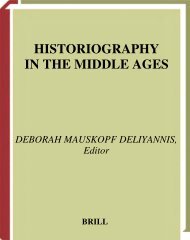Medieval Sexuality: A Casebook - Julian Emperor
Medieval Sexuality: A Casebook - Julian Emperor
Medieval Sexuality: A Casebook - Julian Emperor
Create successful ePaper yourself
Turn your PDF publications into a flip-book with our unique Google optimized e-Paper software.
38 Dominic JanesThere was a long tradition of Protestant wariness towards the confessional as beingquintessentially papist, despite it never having been definitely outlawed in theChurch of England. Those who spoke out against this view were clearly swimmingagainst the tide of general opinion in the eighteenth and nineteenth centuries.For example, the Anglican, Nathaniel Marshall (1680–1729), writing in 1714, theyear before he became Chaplain to the King, wanted to show the relevance andusefulness of ancient penitential traditions, suggesting that confession bereintroduced in England, with certain precautions—it should not be a necessity,superstition should be avoided and there should be “all scrupulosity in theenumeration of sins.” 24 Marshall thought that the early Church standard wastoo severe to be revived, and advocated that of the seventh and eighth centuries. 25He was keen to defend himself against charges of popery from moralists and fromthe “mockery” of “libertines”: “I trust the world is not yet so far gone in mirth,as to be laughed out of so important a thing as religion,” he wrote. 26 He was,above all, careful in his quotations from the Anglo-Saxon penitential of Egbertto quote somber prayers rather than anything smacking of the licentious. 27 ThoughMarshall was not alone in his wish to temper the medieval confessional for usewithin the Anglican Church, on the whole, a confessional role among the ordinaryclergy was adamantly opposed by most in the nineteenth-century Church ofEngland. Confession, it was generally held, was made spiritually in private toGod alone and absolution could not be granted by the minister. 28 At the deathbed,the minister might offer consolation based on “the apparent evidences of a sincererepentance . . . beyond which none can go but the Searcher of hearts.” 29 We aretold that before the Reformation the “abominable system” of private confessionled to:Corruption, vice, immorality, degradation, and pollution . . . It produces arrogancein the priest and presumption in those who confess; pollutes the soul and thebody; it enervates or destroys the healthy power of the conscience; it degrades;it destroys self-respect; it impairs the sense of personal responsibility. 30A central issue—both for those in favour of the modern use of private penanceand for those against—was sex. This seems paradoxical since the very purposeof the penitentials was to “redefine customary understandings of sexuality andsexual practices” in line with an austere moral code. 31 However, as we have seen,modern concerns lay with disciplining the discourse and not simply the practiceof sex. For the likes of Plummer, the heroes of the Christian past were bestthought of without any connection to sexuality at all, even with its effectiverepression. Plummer edited one of the most important collections of Bede’shistorical works and the first in Britain for over a century. Bede, in Plummer’scommentary, appears as a devoted Christian and scholar, towards whom Plummerfeels such an enthusiasm “that I am well content that some trace of my ownpersonal feelings and circumstances should remain in what I have written about













